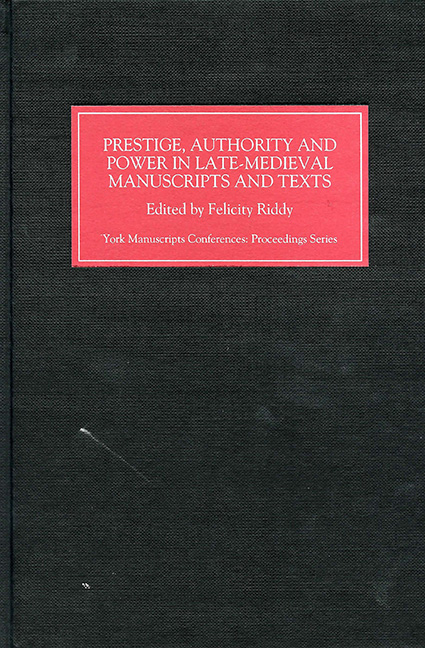Book contents
- Frontmatter
- Contents
- List of Plates
- Introduction
- Inventing Authority: Glossing, Literacy and the Classical Text
- Manuscripts of Nicholas Love's The Mirror of the Blessed Life of Jesus Christ and Wycliffite Notions of ‘Authority’
- The Patronage and Dating of Longleat House MS 24, a Prestige Copy of the Pupilla Oculi Illuminated by the Master of the Troilus Frontispiece
- Limner-Power: A Book Artist in England c. 1420
- A Poet's Contacts with the Great and the Good: Further Consideration of Thomas Hoccleve's Texts and Manuscripts
- The Politics of Book Ownership: The Hopton Family and Bodleian Library, Digby MS 185
- Piety, Politics and Persona: MS Harley MS 4012 and Anne Harling
- The Abbess of Malling's Gift Manuscript (1520)
- ‘Plutarch's’ Life of Agesilaus: A Recently Located New Year's Gift to Thomas Cromwell by Henry Parker, Lord Morley
- Manuscripts after Printing: Affinity, Dissent and Display in the Texts of Wyatt's Psalms
- Index of manuscripts
- Index of names and titles
- York Medieval Press: Publications
Inventing Authority: Glossing, Literacy and the Classical Text
Published online by Cambridge University Press: 24 October 2017
- Frontmatter
- Contents
- List of Plates
- Introduction
- Inventing Authority: Glossing, Literacy and the Classical Text
- Manuscripts of Nicholas Love's The Mirror of the Blessed Life of Jesus Christ and Wycliffite Notions of ‘Authority’
- The Patronage and Dating of Longleat House MS 24, a Prestige Copy of the Pupilla Oculi Illuminated by the Master of the Troilus Frontispiece
- Limner-Power: A Book Artist in England c. 1420
- A Poet's Contacts with the Great and the Good: Further Consideration of Thomas Hoccleve's Texts and Manuscripts
- The Politics of Book Ownership: The Hopton Family and Bodleian Library, Digby MS 185
- Piety, Politics and Persona: MS Harley MS 4012 and Anne Harling
- The Abbess of Malling's Gift Manuscript (1520)
- ‘Plutarch's’ Life of Agesilaus: A Recently Located New Year's Gift to Thomas Cromwell by Henry Parker, Lord Morley
- Manuscripts after Printing: Affinity, Dissent and Display in the Texts of Wyatt's Psalms
- Index of manuscripts
- Index of names and titles
- York Medieval Press: Publications
Summary
The distinctive format of the glossed book, used especially for Biblical texts and law, but later also for secular authors, is the most satisfying model of authorship and textual authority which the Middle Ages has produced.
This statement, taken from Mary Carruthers's study of medieval memoria, seems at first glance a convincing articulation of the relationship of authority and the glossed book. It suggests that the ultimate purpose of glossing is to make texts and, presumably, books authoritative. For certain kinds of manu- script books (whether we look at them from the point of production or of use), this may be true, but it is wrong to make this assertion global or to use it simplistically as a way of ‘explaining’ glosses. The aim of this essay is to look more closely at the question of authority in glossed manuscripts and examine how it is constituted. I shall argue that this particular form of authority is conditioned by external pressures, including what might be termed ‘cultural anxiety’ about authoritative texts, by the actual context of use, and by the literacy of users. Moreover, glosses not only use a variety of strategies to preserve and create authority, but also to undermine and, occasionally, to usurp it. Once again, these strategies are closely informed by audience and the context of use. When we take all this into account, and look at how authority operates in practice, it becomes rather more problematic than Carruthers's statement seems to allow.
I shall be talking in this essay about a particular kind of glossed manuscript in use in a particular context. The general context is the educational system, where the texts of auctores formed the basis of the curriculum, with the trivium and quadrivium both constituted by a collection of authoritative texts. I intend to explore the practice of using what we would call literary texts in the earliest stages of this formal curriculum, in the art of grammar, where the texts formed the basis of instruction in the Latin language itself.
- Type
- Chapter
- Information
- Publisher: Boydell & BrewerPrint publication year: 2000

